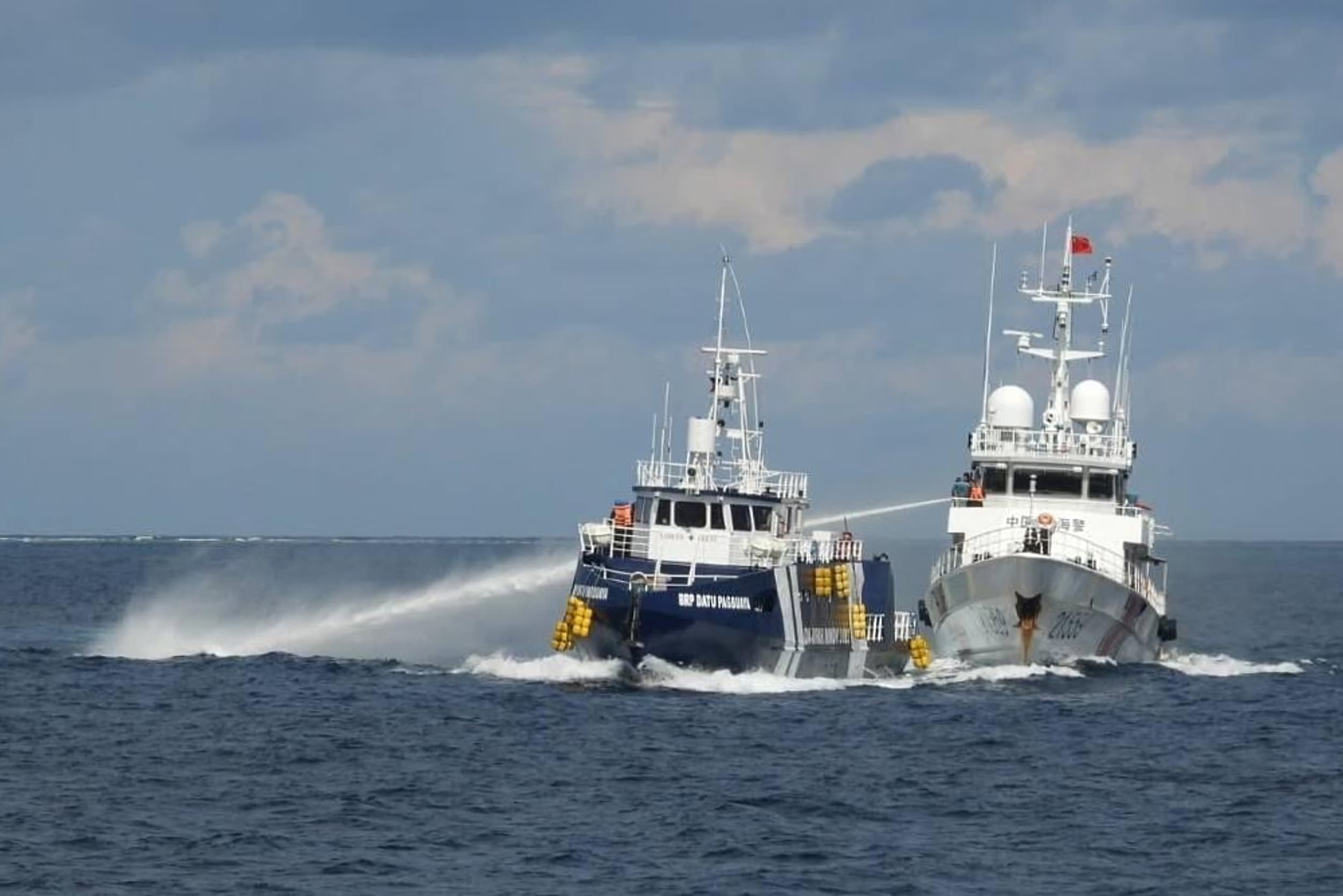We're loading the full news article for you. This includes the article content, images, author information, and related articles.
A Philippine government vessel was rammed and subjected to water cannon attacks by Chinese coast guard ships near Thitu Island in the South China Sea on Sunday, October 12, 2025 EAT, escalating long-standing territorial disputes.

Chinese coast guard ships on Sunday, October 12, 2025 EAT, deployed powerful water cannons and subsequently rammed the BRP Datu Pagbuaya, a Philippine government vessel, near Thitu Island in the disputed South China Sea. The incident resulted in minor structural damage to the Philippine vessel, which is part of a fisheries fleet supporting Filipino fishermen. No injuries were reported among the Filipino crewmen.
The Philippine coast guard reported that the BRP Datu Pagbuaya, along with two other Bureau of Fisheries and Aquatic Resources vessels, was anchored in the territorial waters off Thitu (which the Philippines calls Pag-asa) when Chinese coast guard and suspected militia ships initiated "dangerous and provocative maneuvers."
In response, the Chinese coast guard accused the Philippine vessels of illegally entering what it termed Chinese waters near Sandy Cay, a cluster of sandbars located between Thitu and China's artificial island base, Subi. The Chinese side stated it took "control measures against the Philippine vessels in accordance with the law and resolutely drove them away" after "ignoring repeated stern warnings."
This incident marks the latest escalation in the protracted territorial disputes in the South China Sea, involving Manila, Beijing, and four other governments. China asserts sovereignty over nearly the entire South China Sea, a crucial global trade route.
However, a 2016 international arbitration ruling invalidated China's historic claims, a decision that China has rejected. The United States and its Western and Asian allies, including Japan, Australia, the European Union, and Canada, support this ruling.
The United States immediately condemned China's actions as "aggressive actions in defiance of international law" and reiterated its support for the Philippines, a close Asian treaty ally. U.S. Ambassador to Manila, MaryKay Carlson, commended the Filipino personnel for their "tremendous valor and skill in the face of China's dangerous ramming and use of water cannons."
The Philippine coast guard spokesperson, Commodore Jay Tarriela, affirmed that such aggression would not compel Manila to "surrender a square inch of our territory to any foreign power."
Kenya's government has historically maintained a position that disputes in the South China Sea should be resolved peacefully through consultations and negotiations. In 2016, the Kenyan Ministry of Foreign Affairs stated that it believes any disputes should be settled in accordance with bilateral agreements and the Declaration on the Conduct of Parties in the South China Sea.
Kenya also expressed respect for China's statement of optional exception under Article 298 of the United Nations Convention on the Law of the Sea (UNCLOS), which allows states to exclude certain categories of disputes, including those concerning maritime delimitation, from compulsory arbitration.
The continued aggression in the South China Sea poses significant risks to regional stability and international maritime law. For Kenya, while geographically distant, such geopolitical tensions can have indirect implications, particularly concerning global trade routes and the broader dynamics of international relations, given Kenya's deepening economic ties with China.
China is Kenya's largest trading partner and a major source of investment, particularly in infrastructure projects under the Belt and Road Initiative. The East African nation's stance on the South China Sea dispute reflects its diplomatic balancing act amid increasing global instability.
Observers will be closely monitoring further diplomatic responses from the Philippines, China, and international bodies. The potential for increased militarization in the South China Sea and its impact on freedom of navigation remains a key concern. Kenya's continued engagement with both Western powers and China will be critical in navigating these complex geopolitical currents.
Keep the conversation in one place—threads here stay linked to the story and in the forums.
Sign in to start a discussion
Start a conversation about this story and keep it linked here.
Other hot threads
E-sports and Gaming Community in Kenya
Active 9 months ago
The Role of Technology in Modern Agriculture (AgriTech)
Active 9 months ago
Popular Recreational Activities Across Counties
Active 9 months ago
Investing in Youth Sports Development Programs
Active 9 months ago